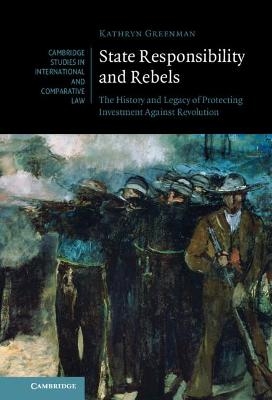
State Responsibility and Rebels
The History and Legacy of Protecting Investment Against Revolution
Seiten
2021
Cambridge University Press (Verlag)
978-1-316-51729-1 (ISBN)
Cambridge University Press (Verlag)
978-1-316-51729-1 (ISBN)
This book is for readers interested in the history of international law and arbitration, offering a comprehensive account of the operation of mixed claims commissions in the context of the decolonisation of Latin America and a fresh perspective on the question of responsibility for rebels and other non-State armed actors.
This book traces the emergence and contestation of State responsibility for rebels during the nineteenth and early-twentieth centuries. In the context of decolonisation and capitalist expansion in Latin America, it argues that the mixed claims commissions-and the practices of intervention associated with them-served to insulate economic order against revolution, by taking the question of who assumed the risk of harm by rebels out of the scope of national authority. The jurisprudence of the commissions was contradictory and ambiguous. It took a lot of interpretive work by later scholars and codifiers to rationalise rules of responsibility out of these shaky foundations, as they battled for the meaning and authority of the arbitral practice. The legal debates were structured around whether the standard of protection against rebels owed to aliens was nationally or internationally determined and whether it was domestic or international authority that adjudicated such standard-a struggle over the internationalisation of protection against rebels.
This book traces the emergence and contestation of State responsibility for rebels during the nineteenth and early-twentieth centuries. In the context of decolonisation and capitalist expansion in Latin America, it argues that the mixed claims commissions-and the practices of intervention associated with them-served to insulate economic order against revolution, by taking the question of who assumed the risk of harm by rebels out of the scope of national authority. The jurisprudence of the commissions was contradictory and ambiguous. It took a lot of interpretive work by later scholars and codifiers to rationalise rules of responsibility out of these shaky foundations, as they battled for the meaning and authority of the arbitral practice. The legal debates were structured around whether the standard of protection against rebels owed to aliens was nationally or internationally determined and whether it was domestic or international authority that adjudicated such standard-a struggle over the internationalisation of protection against rebels.
Kathryn Greenman is Lecturer in Law at the University of Technology Sydney. She is a co-editor of Revolutions in International Law: The Legacies of 1917 (Cambridge University Press, 2021) with Anne Orford, Ntina Tzouvala and Anna Saunders.
1. The past and present of state responsibility for rebels; 2. The system: mixed claims commissions in the shadow of empire; 3. The cases: autonomy, ambiguity and doctrine in the work of the commissions; 4. The scholarship: resistance and development; 5. The codification projects: stalemate; 6. The legacy: protecting investment against revolution in the decolonised world.
| Erscheinungsdatum | 20.08.2021 |
|---|---|
| Reihe/Serie | Cambridge Studies in International and Comparative Law |
| Zusatzinfo | Worked examples or Exercises |
| Verlagsort | Cambridge |
| Sprache | englisch |
| Maße | 150 x 235 mm |
| Gewicht | 520 g |
| Themenwelt | Geschichte ► Teilgebiete der Geschichte ► Militärgeschichte |
| Recht / Steuern ► EU / Internationales Recht | |
| Recht / Steuern ► Rechtsgeschichte | |
| ISBN-10 | 1-316-51729-2 / 1316517292 |
| ISBN-13 | 978-1-316-51729-1 / 9781316517291 |
| Zustand | Neuware |
| Haben Sie eine Frage zum Produkt? |
Mehr entdecken
aus dem Bereich
aus dem Bereich
neueste Manipulationstechniken als Waffengattung der NATO
Buch | Softcover (2023)
Westend (Verlag)
24,00 €
Deutschlands Schwäche in der Zeitenwende
Buch | Softcover (2023)
C.H.Beck (Verlag)
18,00 €


